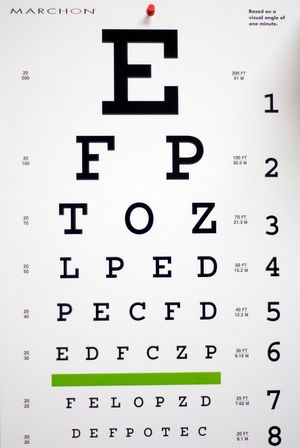
Your Comprehensive Eye Exam
During a complete eye exam, your Round Rock eye doctor will not only determine your prescription for eyeglasses or contact lenses, but will also check your eyes for common eye diseases, assess how your eyes work together as a team and evaluate your eyes as an indicator of your overall health.
A comprehensive eye exam includes a number of tests and procedures to examine and evaluate the health of your eyes and the quality of your vision. These tests range from simple ones, like having you read an eye chart, to complex tests, such as using a high-powered lens to examine the health of the tissues inside of your eyes.
During your exam the eye specialist will also look for refractive errors. Refractive error relates to an imprecision in the way that the eye fixates on light. The end outcome of a refractive error is a reduction of visual acuity (i.e. acuteness or quality of vision). In the event of insignificant refractive error, patients sometimes prefer to leave the problem uncorrected. However, if the issue infringes on the patient's ability to carry out their routine jobs, then action has to be undertaken.
In the course of your eye examination, the optometrist will establish the trouble and outline the possibilities for the patient. In many cases, refractive error will be handled be wearing glasses or contact lenses. In more acute circumstances, the patient will decide to have refractive surgery. This can all be clarified further by your experienced eye doctor at the time of the course of your eye exam.
Eye care experts, such as your Round Rock optometrists, recommend you have a complete eye exam every year to assess yourHelp your child choose eyewear risk for potentially damaging eye conditions, as well as to keep on top of any changes in vision you may be experiencing.
Children's Eye Care in Round Rock
Some experts estimate that approximately 5% to 10% of pre-schoolers and 25% of school-aged children have vision problems. According to the American Optometric Association (AOA), all children should have their eyes examined at 6 months of age, at age 3 and again at the start of school. Children without vision problems or risk factors for eye or vision problems should then continue to have their eyes examined at every year throughout school.
Children with existing vision problems or risk factors should have their eyes examined more frequently. Common risk factors for vision problems include:
- premature birth
- developmental delays
- turned or crossed eyes
- family history of eye disease
- history of eye injury
- other physical illness or disease
The AOA recommends that children who wear eyeglasses or contact lenses should have their eyes examined at least every 12 months or according to their eye doctor's instructions. Read more about Pediatric Eye Exams.
Learn about How the 2014 Health Care Reform provides vision care for children here.
Adult Eye Care
The AOA also recommends an annual eye exam for any adult who wears eyeglasses or contacts. If you don't normally need vision correction, you still need an eye exam every year. Doctors often recommend more frequent examinations for adults with diabetes, high blood pressure and other disorders, because many diseases can have an impact on vision and eye health.
If you are over 40, it's a good idea to have your eyes examined every one to two years to check for common age-related eye problems such as presbyopia, cataracts and macular degeneration. Read more about Vision After 40.
Because the risk of eye disease continues to increase with advancing age, everyone over the age of 60 should be examined annually. Read more about Vision After 60.

